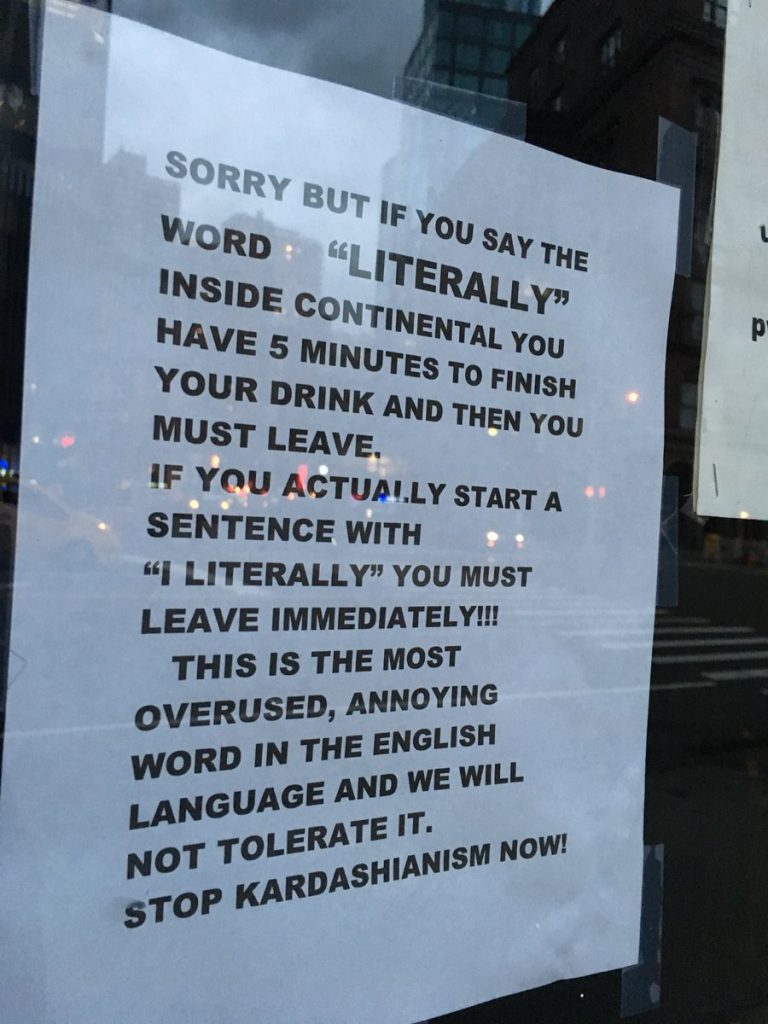I guess we all learned something new yesterday, thanks to a certain headline … Continue reading
Category Archives: In the news …
In the news: a linguistic Brexit? (“French leave”)
Exactly a year after the historic Brexit referendum, a British MP looks likely to achieve her goal of seeing another major change in citizenship in Europe — in a popular English expression. A bill has been steered through Parliament by the Conservative MP for Anglebury, Avril Berner, who has called for the expression “French leave” — meaning “absence from work or duty without permission” (OED) — to be changed to “English leave” in dictionaries and school textbooks throughout the UK. In a four-page document, which was reported by Parliament Today to have reached Buckingham Palace for the Queen’s signature on Thursday, the anniversary of the landmark 2017 vote, Berner argued that the word French has no business holding its place in standard British English, especially as the island nation continues to negotiate its economic and legal separation from the European mainland. Interestingly, the French equivalent for the phrase is “filer a l’anglaise” — meaning literally “to leave English-style”. The nearly 250-year-old phrase “French leave” is first recorded in 1771.
***
Other English terms that contain the names of European nationalities are:
- Spanish fly: an aphrodisiac, made from the dried blood of Spanish beetles
- Dutch cap: a contraceptive diaphragm
- French letter: another contraceptive, a condom
***
Hall v Swift Dismissal: the uncreativity of [noun] gonna [verb]
Last year, songwriters Sean Hall and Nathan Butler sued Taylor Swift, arguing that in her single “Shake It Off” she stole a phrase from their composition “Playas Gon’ Play.” Their lawsuit hinged on the phrase “playas, they gonna play, and haters, they gonna hate” — the chorus of their song.
In short, they lost. And it seems they were always [gonna] lose. “At the hearing, Plaintiffs’ counsel offered alternative (very clunky) formulations of pairing a noun with its intransitive verb, thereby suggesting that “[noun] gonna [verb]” was creative in itself. While clever, this argument does not persuade. The argument ultimately only makes sense if the use of “gonna” as a contraction of “is going to” is sufficiently creative, or (as discussed above) one can claim creativity in asserting that a type of person acts in accordance with his or her inherent nature. To explicitly state the argument is to see how banal the asserted creativity is. In sum, the lyrics at issue – the only thing that Plaintiffs allege Defendants copied – are too brief, unoriginal, and uncreative to warrant protection under the Copyright Act.” The BBC told the full story.
***
In the news: An Address on the State of the Uniom (sic)
Tickets issued for President Trump’s first State of the Union address contain a misspelling of the word “Union.”
Sic. (And if you don’t believe us, or Marco Rubio, check Snopes.)
***
In the news: An NYC dive bar bans the word “literally”
“The owner of East Village dive bar Continental seems to have had enough: A prominent notice now hangs outside warning what will happen if customers let [the word literally] slip once inside: ‘You must leave.'” New York magazine’s “Grub Street” has the story.
***
To print or not to print: Presidential expletives
During a bipartisan meeting on immigration reform, President Trump reportedly asked lawmakers why “all these people from sh*thole countries” should be allowed to move to the United States. (He was referring, apparently, to Haiti and African countries.) Many news media outlets yesterday took to their keyboards and airwaves quoting him verbatim: the word “shithole” was suddenly seen and heard all over the world, even without the censoring asterisks in many cases. The New York Times reports on how the media is tackling this new peculiar challenge: the regular use of vulgarity and profanity by our nation’s leader in his public outbursts statements.
Here’s what the Associated Press’s style guide says about profanity: “AP Style holds that you should not use obscenities in stories unless they are part of direct quotations and there is a compelling reason for them.”
It seems there’s a good reason today.
***
In the news: “Youthquake” is word of the year, despite lack of tremors
Youthquake. Ever heard that word before? I hadn’t either, and neither had most of the world — including a lot of ‘youths’ who are supposed to be using it. Oxford Dictionaries declared youthquake 2017’s word of the year, even though a) it’s been around since the ’60s, and b) apparently no-one seems to use it much. … Continue reading
“Bombogenesis”, “bomb cyclone”: new words for a new reality
It’s not just any old Nor’easter heading towards America’s east coast today. It’s a “bomb cyclone,” folks. That’s another name for a word that most of the world has learned in the last 48 hours. Mashable first coined the phrase “bomb cyclone” as a more punchy synonym for the meteorological term bombogenesis. But what the nor’easter is a bombogenesis? Continue reading
Words banished in 2017
What do the words and word-pairs unpack, impactful, tons, “drill down” and “gig economy” have in common? Continue reading











